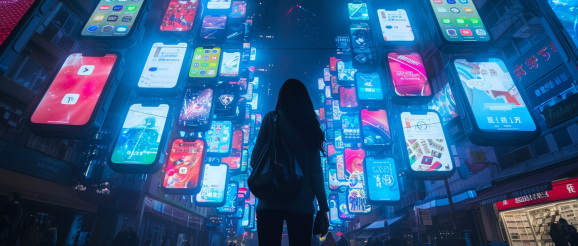Innovation or Monopoly? The DOJ’s Clash with Apple Explained | Ave Maria School of Law

By Sabrina Martinez, Smith Business Law Fellow J.D. Candidate, Class of 2025 Innovation or Monopoly? The DOJ’s Clash with Apple Explained The U.S. Justice Department (DOJ), along with 16 state and district attorney generals, has filed an antitrust lawsuit against Apple.[i] This action alleges that Apple has unlawfully monopolized the smartphone industry in violation of Section 2 of the Sherman Act.[ii] It claims that Apple maintains its market dominance by imposing restrictive contracts and withholding vital access to developers.[iii] The goal of the lawsuit is to restore competitive conditions within the market.[iv] The DOJ is targeting Apple’s “walled garden” approach, alleging it makes it difficult for rivals to compete and customers to switch to other products.[v] According to the DOJ, this approach stifles innovation and reinforces Apple’s monopoly by making it difficult for competitive technologies to emerge.[vi] The Justice Department’s lawsuit suggests that these same practices that Apple deems as beneficial to the user experience are, in fact, anticompetitive and allow Apple to unlawfully maintain its market power.[vii] Attorney General Merrick B. Garland has spoken out about the case, emphasizing the critical need for fair competition and consumer safeguards in the digital arena.[viii] Additionally, he stressed the importance of competition in fostering innovation, reducing prices, and expanding consumer choices.[ix] There can be detrimental effects from permitting any single entity to exercise unbridled power to dictate terms or obstruct competitive practices, especially in critical industries like application distribution. Apple disagrees with the accusations and plans to “vigorously defend” itself against the lawsuit, stating its position is rooted in the company’s philosophy and business model.[x] Apple has long maintained that the tightly controlled ecosystem of its devices and software is designed to ensure quality, security, and a seamless user experience.[xi] This philosophy argues that by controlling the hardware, software, and services, Apple can provide superior functionality and a more intuitive interface, which is a significant factor to its consumer brand loyalty and overall success.[xii] From Apple’s perspective, the practices under scrutiny are legitimate business strategies essential for maintaining its products’ integrity, security, and user-friendly nature.[xiii] The company views its App Store, for example, as a curated platform that safeguards users against malware and provides a trusted space for transactions, contrasting it with the more open but potentially riskier environments seen in other platforms.[xiv] The ramifications of these allegations are profound, with the potential to disrupt the current dynamics within technology regulation significantly. By leveraging its expansive platform, Apple could establish an unfavorable precedent, making it exceedingly challenging for smaller entities and newcomers to compete or introduce innovative products.[xv] The ripple effects of such actions are believed to extend well beyond mere financial implications, posing existential threats to diversity and progress within the sector. The legal scrutiny highlights a growing sentiment that, without intervention, the current trajectory could erode the industry’s competitive character, impeding both current and future innovation. This lawsuit signifies a critical step towards enforcing antitrust laws and safeguarding a competitive environment where businesses thrive and consumers benefit. As technology continues to shape our lives, it becomes increasingly essential to uphold principles of fairness and competition to foster innovation and protect consumer interests. If the court sides with the Justice Department, it could mean that Apple will have to alter its business practices significantly, potentially affecting its product strategy, software development, and overall market approach. [i] Press Release, Off. of Pub. Affairs, Justice Dep’t Sues Apple for Monopolizing Smartphone Mkts., United States Department of Justice (Mar. 21, 2024), https://www.justice.gov/opa/pr/justice-department-sues-apple-monopolizing-smartphone-markets [ii] Id. [iii] Id. [iv] Id. [v] Moon & Bonk, Justice Dep’t. Files Antitrust Lawsuit Against Apple Over its Infamous ‘Walled Garden’, Yahoo News (Mar. 21, 2024), https://news.yahoo.com/justice-department-files-antitrust-lawsuit-against-apple-over-its-infamous-walled-garden-144834571.html [vi] Id. [vii] Id. [viii] Fung et al., Apple Sued in a Landmark iPhone Monopoly Lawsuit, CNN Business (Mar. 21, 2024), https://www.cnn.com/2024/03/21/tech/apple-sued-antitrust-doj/index.html [ix] Id. [x] Miller, U.S. Sues Apple: Read the full DOJ Lawsuit Doc. Here, 9to5Mac (Mar. 21, 2024), https://9to5mac.com/2024/03/21/doj-sues-apple-full-lawsuit-document-here/ [xi] The Genius Behind Apple’s Design Philosophy: An In-Depth Look at Their Aesthetic Approach, The Inspire Talks (July 13, 2024), https://theinspiretalks.com/apple-review/ [xii] Id. [xiii] Miller, supra note 10. [xiv]Apple Inc., App Sec. Overview, Apple Support (May 13, 2022), https://support.apple.com/en-gb/guide/security/sec35dd877d0/web [xv] Miller, supra note 10.
